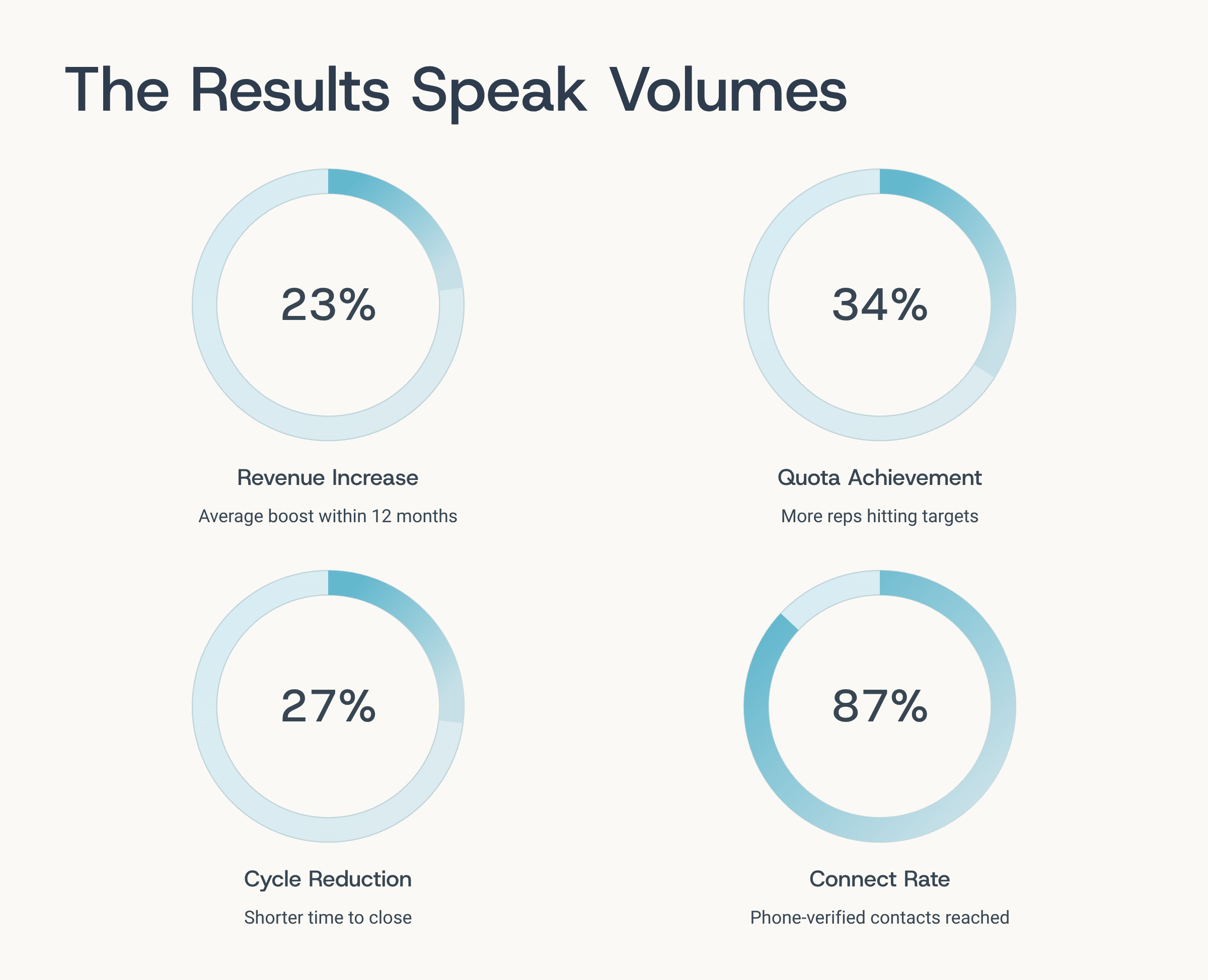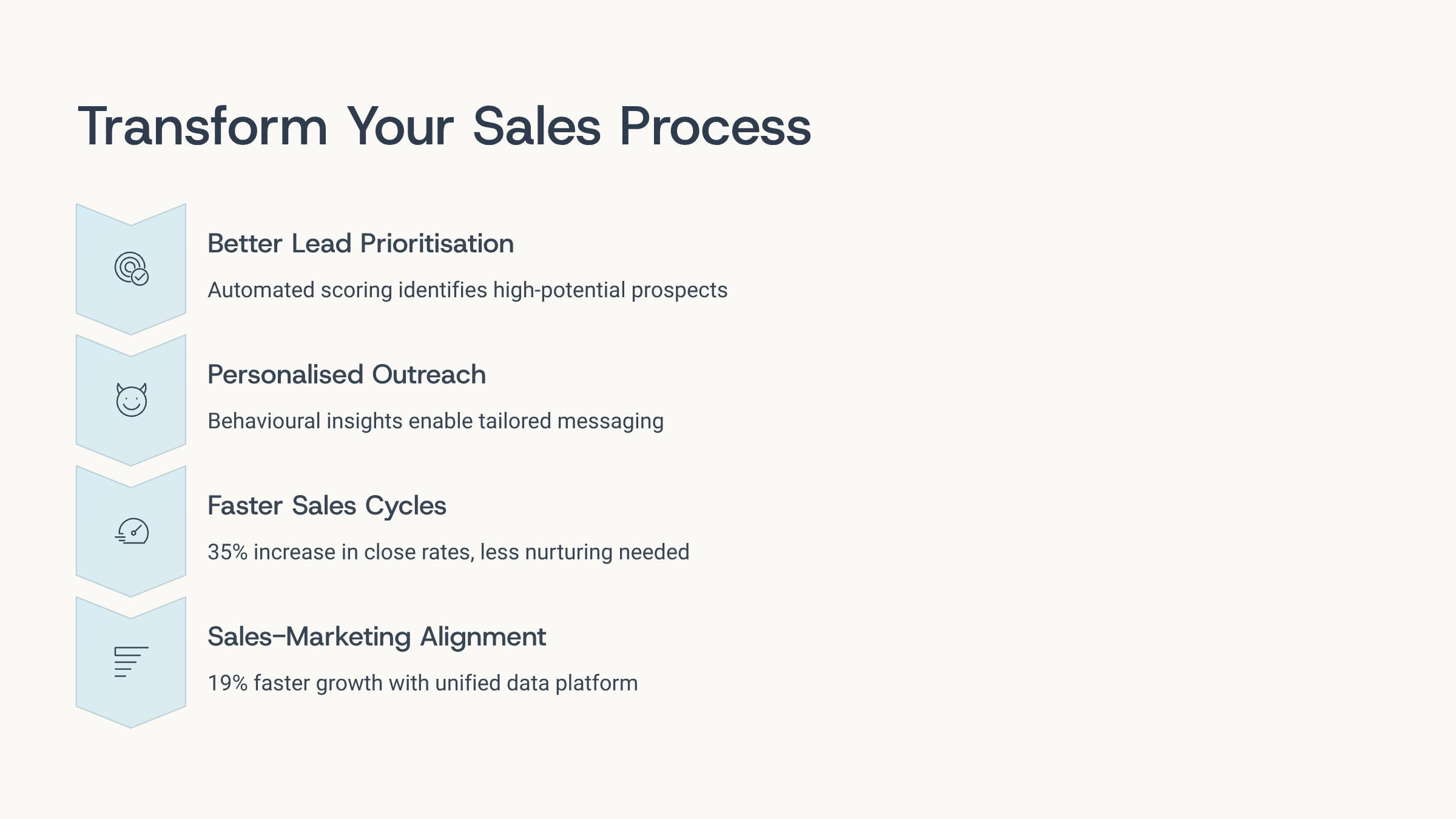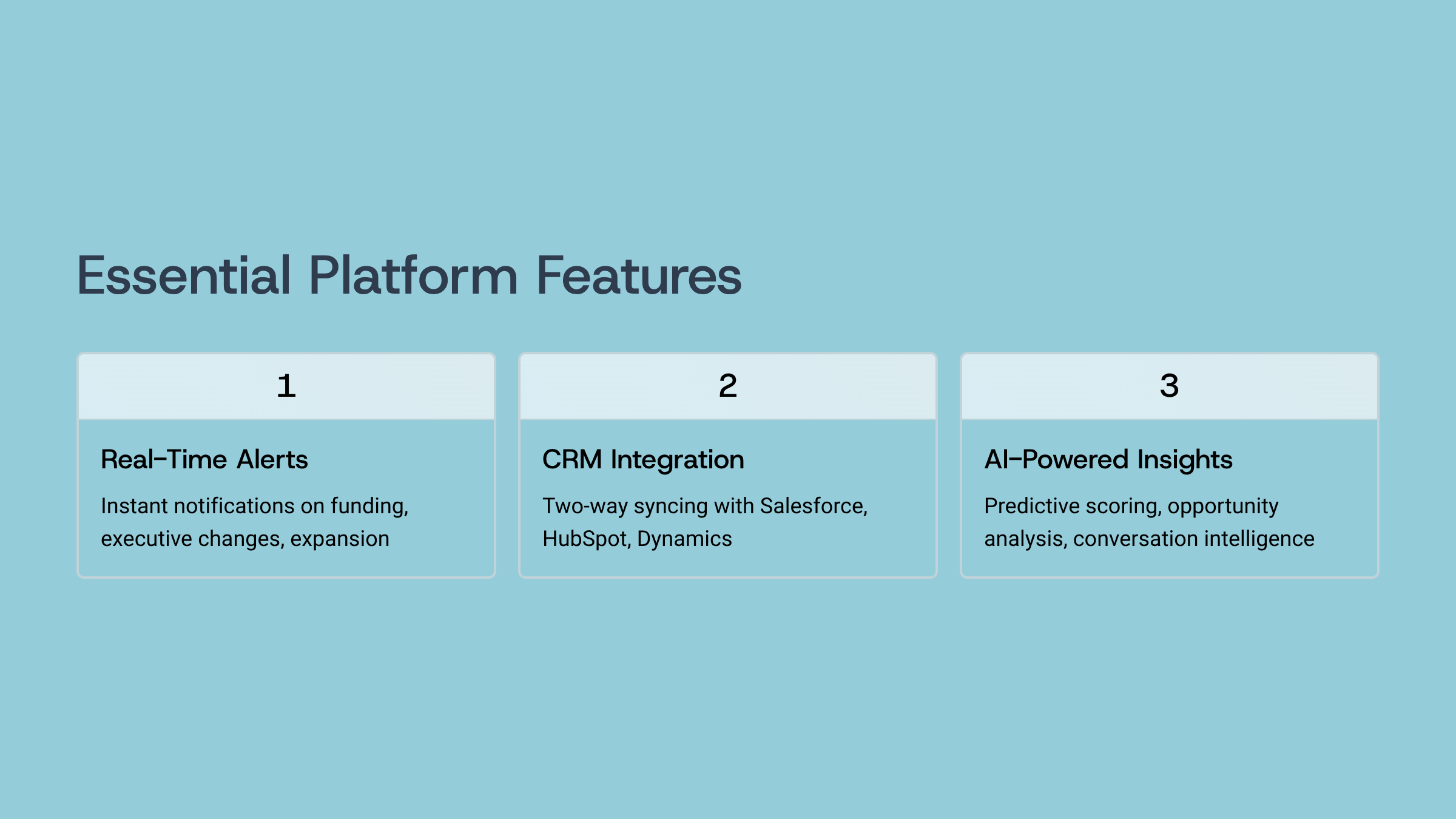Why Your Sales Team Needs a Sales Intelligence Platform in 2026
Article written by
Kate Williams

INSIDE THE ARTICLE
SHARE THIS ARTICLE
Summary
Guessing is out. Knowing is in. This blog breaks down what real sales intelligence looks like today—tracking intent, surfacing buyer signals, and helping reps target the right accounts with the right message at the right time. If your team is still cold-calling random lists, read this before your competitors read your prospects' minds first.
While your reps are busy playing detective on company websites, your competitors are already three steps ahead. They’re using sales intelligence platforms that do in 5 minutes what takes your team 5 hours. And let’s be honest—that’s not fair to your team or your revenue goals.
In this blog, I’ll unpack why the top-performing sales teams have already made the switch. (Spoiler: it’s not because they’re tech nerds chasing shiny tools.) It’s because they realized something simple but powerful—every hour spent researching is an hour not spent selling.
What is Sales Intelligence Actually?
What does "sales intelligence" actually mean beyond the buzzword bingo? Let's get it straight, because I'm tired of hearing people throw around fancy terms without explaining what they actually do for your quota.
Sales intelligence is basically like having a really, really good private investigator working for your sales team 24/7. Except this investigator never sleeps, never asks for a raise, and can research 1,000 prospects simultaneously without breaking a sweat.
Sales intelligence platforms collect information from hundreds of sources - think social media, company websites, news articles, job postings, funding announcements, technology adoption patterns, and even those random industry reports that nobody actually reads. Then they organize all this scattered information into something your sales reps can actually use.
Here's what makes this different from your current approach (in a hypothetical scenario):
Traditional research method: Your rep spends 3 hours researching prospects. They discover that they have 200 employees, sell widgets, and their website hasn't been updated since 2019. Your rep then sends a generic email about how your solution can "help them scale their business." Response rate: roughly the same as winning the lottery.
Sales intelligence approach: The platform tells your rep that they just hired 15 new salespeople, their current CRM contract expires in 60 days, their VP of Sales has been actively engaging with competitive content, and they just secured Series B funding. Your rep sends a targeted message about CRM migration strategies and gets a 20-minute discovery call booked the same day.
See the difference? It's like the difference between hunting with a stick versus hunting with a heat-seeking missile.
The numbers here aren't just impressive - they're the kind that make CFOs actually smile during budget meetings:
- 23% average revenue increase within 12 months (yes, you read that right)
- 31% boost in high-value selling activities
- 34% more reps hitting their quota consistently
- 27% reduction in sales cycle length
- 18% increase in average deal size
And before you ask, no, these aren't cherry-picked numbers from the one company that happened to implement everything perfectly. This is industry-wide data from companies that range from scrappy startups to Fortune 500 enterprises.

Why Sales Intelligence Platforms Are Actually Worth Your Sanity (And Your Revenue)
Here's how sales intelligence platforms actually solve your regular hassles:
Lead Scoring That Makes Sense
Sales intelligence platforms automatically score prospects based on real behavior, not just demographic data. The platform looks at things like:
- Who's actually visiting your website (and what pages they're obsessing over)
- Which companies are downloading your competitors' content
- Who just got funding or expanded their team
- Which decision-makers are actively researching solutions like yours
Instead of your reps playing eeny-meeny-miny-moe with their prospect list, they get a ranked, prioritized list of people who are actually ready to have a conversation. It's like having a crystal ball, except it's backed by actual data instead of wishful thinking.
Personalization That Doesn't Sound Like a Robot Wrote It
Raise your hand if you've ever received an email that started with "I hope this email finds you well" and immediately wanted to delete it. Everyone? Good, we're all on the same page here.
Sales intelligence platforms give your reps the ammunition they need for personalization that actually works. We're talking about insights like,
- The prospect's company just acquired a competitor
- Their current technology stack is about to hit end-of-life
- They attended three webinars about your solution category last month
- Their boss just posted on LinkedIn about scaling challenges
Your reps can craft messages that sound like they actually did their homework instead of mass-mailing the phone book. The result? Response rates that make your marketing team jealous and conversations that actually go somewhere.
Shorter Sales Cycles (Because Time Really Is Money)
Sales intelligence platforms eliminate the weeks of back-and-forth that usually happen at the beginning of every sales cycle. Your reps can skip the "tell me about your company" phase and jump straight into "here's how we solve your specific problem."
Teams using these platforms report 35% faster deal closure, and when you think about it, that makes perfect sense. When you show up to a conversation already understanding the prospect's challenges, timeline, and decision-making process, you're not starting from zero - you're starting from knowledge.
Sales and Marketing Alignment (Yes, It's Actually Possible)
We all know sales and marketing teams have a complicated relationship. Sales thinks marketing delivers unqualified leads. Marketing thinks sales doesn't follow up properly. It's like a dysfunctional marriage where everyone argues about who's not doing their job.
Sales intelligence platforms create a single source of truth that both teams work from. When everyone's looking at the same lead scores, engagement data, and behavioral insights, the finger-pointing stops and the collaboration actually starts.
Companies with strong sales-marketing alignment grow 19% faster and see 15% higher profitability. That's not just correlation - that's the power of two teams working toward the same goals with the same information.

5 Features to Look for in Your Sales Intelligence Tools
What actually matters when you're evaluating these platforms? Especially when every vendor is going to show you flashy dashboards and claim their AI is revolutionary. Here's what you should actually care about:
1. Real-Time Alerts That Don't Spam Your Inbox
You know what's useless? Getting an alert that your prospect got funding... six months after it happened. You know what's golden? Getting an alert the moment it hits the news so you can be the first vendor to congratulate them and position your solution for their growth plans.
Good sales intelligence platforms monitor thousands of data sources in real-time and send you alerts when things happen that actually matter for your deals. We're talking about:
- Funding announcements
- Executive changes
- Expansion news
- Technology acquisitions
- Competitive activity
The key here is filtering out the noise. You want platforms that learn what triggers are actually useful for your team, not ones that flood you with every press release and blog post mention.
2. CRM Integration That Actually Works
Your platform needs to live inside your CRM workflow, not alongside it. Hence, you need to look for solutions that:
- Sync data automatically both ways
- Display insights directly in your CRM interface
- Update records without manual data entry
- Work with your existing sales tools and processes
Companies using fully integrated solutions see shorter sales cycles and higher conversion rates. That's the power of eliminating friction from your sales process.
3. AI That's Actually Smart (Not Just a Marketing Buzzword)
Every vendor is going to claim they have "AI-powered insights." Most of them are just running basic if-then logic and calling it artificial intelligence. Here's what real AI looks like in sales intelligence:
- Predictive lead scoring that gets more accurate over time
- Conversation analysis that identifies winning talk tracks
- Opportunity insights that predict which deals are at risk
- Behavioral pattern recognition that spots buying signals
The companies that get ahead in utilizing the true power of AI are the ones that will dominate their markets while competitors might still be manually qualifying leads.
4. Data Accuracy You Can Trust
Bad data is worse than no data. When your rep calls a prospect and finds out they left the company six months ago or sends a pitch for manufacturing software to a consulting firm, you're not just wasting time - you're damaging your brand.
Top-tier platforms maintain 95%+ accuracy rates through multiple verification processes. They cross-reference information from hundreds of sources and use AI to validate contact details before they hit your CRM.
Check for providers that are transparent about their data quality metrics and offer guarantees or credits when information is inaccurate.
5. Intent and Technographic Data That Tells the Real Story
Intent data shows you when prospects are actively researching solutions like yours. Technographic data reveals what technology they're currently using and when they might be ready to switch.
Combined, these datasets help you identify companies that are in active buying cycles and approach them with messages that address their specific technology challenges and replacement timelines.
This isn't just nice-to-have information - it's the difference between cold outreach and warm conversations.

How Sales Intelligence Platforms Drive Real Results
The ground evidence shows how sales intelligence platforms create measurable business results. The numbers in the below case study will tell you the real-impact.
Case study: Increasing cold-call success rates
A leading advertising enterprise in B2B services saw amazing results after using a sales intelligence platform. Their qualified leads shot up by 45% in just three months. Sales reps who use AI-driven sales intelligence close more deals than those who don't. Cognism helped its client set up "100-200 new meetings per week" with better contact accuracy. The company's success came from accurate data—their quality was about 30% better than other options they tested.
Choosing the Best Sales Intelligence Software for Your Team
Finding the perfect sales intelligence platform customized for your sales team starts with understanding your own needs. Your team must move through the crowded marketplace of 2026 with a methodical approach that will lead to the right investment. Here is how you can do it:
Assessing your sales process needs
Define your objectives clearly before looking at tools. We focused on improving lead generation, enhancing customer insights, and streamlining coverage. Your goals must match the tool's capabilities to make success more achievable.
Evaluating data coverage and quality
Data quality forms the foundation of any effective sales intelligence software. The best platforms verify information from hundreds of sources. Top providers achieve data accuracy rates of 95% or higher through triple-verification processes. Geographic coverage deserves extra attention, especially for international market targeting. Phone-verified mobile numbers have become valuable assets. Sales teams can connect with up to 87% of their prospect list.
Comparing pricing and scalability
Transparent pricing models show vendor integrity. Also, your chosen platform should grow with your business without affecting performance. The platform must adapt to different team structures as your company expands.
The Top 10 Sales Intelligence Platforms That Actually Move the Revenue Needle
After analyzing dozens of platforms and talking to hundreds of sales teams, here are the solutions that consistently deliver measurable results. I'm going to be honest about what each one does well and where they might not be the right fit.
1. SparrowGenie - When RFP Response Time Makes or Breaks Your Deal
While most sales intelligence platforms focus on the front end of your sales process, SparrowGenie is all set to tackle a problem that's probably costing you deals right now: slow proposal responses.
Think about your last RFP process. How long did it take your team to respond? Two weeks? Three weeks? A month? While you were crafting the perfect response, your competitor with a faster turnaround time probably already won the deal.
SparrowGenie uses AI to help sales teams respond to complex RFPs and proposals in days instead of weeks, while maintaining accuracy and compliance standards. The platform combines automation with human oversight, so you're not sacrificing quality for speed. This is perfect for enterprise sales teams dealing with complex procurement processes where proposal quality and response speed often determine who wins. If you're losing deals because you can't respond fast enough to RFPs, this solves that problem.
The platform maintains strict compliance standards while dramatically accelerating response times. For teams drowning in proposal requirements who need to maintain their competitive edge, SparrowGenie focuses on the part of the sales cycle where deals are actually won or lost.
2. ZoomInfo - The Data Powerhouse Everyone Talks About
ZoomInfo does pretty much everything, and it does most of it really well. They've got over 100 million company profiles and 220 million professional contacts, all verified through pretty sophisticated AI systems.
What makes ZoomInfo stand out is their intent data and conversation intelligence. They can tell you which companies are actively researching your solution category and provide insights from sales call analysis that help your entire team improve their performance.
The downside? It's expensive, and it can be overkill for smaller teams. If you're running large-scale outbound programs and have the budget for enterprise-grade data, ZoomInfo is hard to beat. If you're a 10-person sales team, you might want to look elsewhere.
Their CRM integration is solid, and their search filtering capabilities are probably the most advanced in the market. For enterprise organizations that need comprehensive data and have the resources to use it effectively, ZoomInfo delivers.
3. Cognism - For When Compliance Actually Matters
Cognism built their entire platform around GDPR compliance and data accuracy. Their phone-verified mobile numbers consistently deliver higher connection rates than their competitors, and their LinkedIn extension makes social selling feel natural instead of creepy.
The platform includes intent signals that help identify prospects entering active buying cycles, and their ethical data practices appeal to companies that care about doing things the right way. If you're expanding internationally or working in industries where data compliance isn't optional, Cognism eliminates the legal headaches while still delivering the prospecting power you need.
4. Apollo - The All-in-One Solution That Actually Works
Apollo is what happens when someone builds a sales intelligence platform for people who actually have to use it every day. They've combined prospecting, email automation, and CRM integration in a single platform that doesn't require a computer science degree to operate.
Their contact database feeds directly into email sequences and outreach campaigns, with personalization features that help your messages stand out without sounding like a robot wrote them.
What I like about Apollo is that they focused on workflow efficiency instead of just cramming in as many features as possible. The platform handles everything from lead discovery to email tracking without making you feel like you need a manual to figure it out.
For growing teams that need powerful functionality without enterprise complexity, Apollo hits the sweet spot between capability and usability.
5. LinkedIn Sales Navigator - Because LinkedIn Is Where B2B Happens
We all know that our prospects are on LinkedIn. They're posting about their challenges, engaging with content, and networking with their peers. LinkedIn Sales Navigator turns all that activity into qualified sales opportunities.
The advanced search capabilities help you identify prospects based on specific criteria, while lead recommendations surface warm introductions and mutual connections. The platform tracks engagement with your content and provides company insights that make relationship building scalable.
If your buyers live on LinkedIn (and most B2B decision-makers do), Sales Navigator transforms social interactions into pipeline. The integration with major CRM platforms means your social selling activities actually contribute to your sales metrics.
The key is using it strategically, not just as a glorified contact scraper. When you combine LinkedIn's relationship data with your sales process, conversations happen naturally instead of feeling forced.
6. Easy Redmine - When Your Sales Process Is Actually Complex
Easy Redmine bridges the gap between sales and delivery by combining CRM functionality with project management capabilities. You can manage everything from initial prospecting to post-sale delivery in a single platform.
The AI-driven automations help streamline repetitive tasks while maintaining team alignment across departments. For B2B companies with complex sales processes that require coordination between sales, implementation, and delivery teams, Easy Redmine provides the visibility you need.
This works particularly well for companies selling solutions that require significant post-sale implementation and project management.
7. CloudTalk - For Teams That Still Believe in Phone Conversations
CloudTalk focuses on what many platforms overlook: making phone-based sales activities more strategic and measurable. Their sales intelligence emphasizes streamlined calling workflows, contact enrichment, and detailed tracking of phone interactions.
The platform helps teams optimize their phone-based sales strategies with call analytics and conversation insights. If your sales process relies heavily on phone conversations and relationship building through direct voice contact, CloudTalk makes those activities more effective.
This isn't for everyone - if your buyers don't take phone calls, you won't get much value here. But for industries where relationships are built through conversation, CloudTalk provides tools that actually help.
8. Datanyze - Intelligence Without the Enterprise Price Tag
Not every team has a six-figure budget for sales intelligence. Datanyze offers solid lead generation and competitor monitoring for smaller teams who need powerful prospecting tools without enterprise pricing.
The platform provides lead scoring and tracks technology adoption patterns to identify companies ready for your solution. Their approach focuses on practical sales intelligence that smaller teams can actually implement without requiring dedicated analysts.
9. UpLead - When Data Quality Actually Matters More Than Quantity
UpLead emphasizes data accuracy over database size, providing verification tools that ensure your outreach reaches real decision-makers.
The platform's focus on quality helps teams achieve higher response rates and lower bounce rates. Their verification features reduce the embarrassment of calling someone who left the company six months ago.
Direct outreach features and CRM synchronization make it straightforward to convert contacts into conversations. Sometimes straightforward beats complicated, especially for teams that want reliable data without complex workflow requirements.
10. HubSpot - The Platform Your Team Will Actually Use
HubSpot combines CRM functionality with sales intelligence in an interface that doesn't require a computer science degree to navigate.
The platform provides engagement tracking, pipeline management, and integrated marketing tools for complete sales lifecycle management. Their emphasis on ease of use delivers comprehensive sales intelligence that grows with your team.
HubSpot works well for companies wanting powerful functionality wrapped in design that actually gets adopted by sales teams. The integrated approach helps smaller companies avoid the complexity of managing multiple point solutions while scaling their sales operations.
How to Choose the Right Platform Without Making a Expensive Mistake
Okay, here's where we get practical about making this decision. Because choosing the wrong sales intelligence platform isn't just disappointing - it's expensive and demoralizing for your team.
Start with Honest Self-Assessment
Before you fall in love with flashy demos and feature lists, take a hard look at your current sales process. What's actually broken? Where are deals getting stuck? What's causing your reps the most frustration?
Different platforms excel at different problems:
- If your team can't find good prospects, focus on database quality and search capabilities
- If proposals are killing your deal velocity, look at solutions like SparrowGenie
- If your sales cycles are too long, prioritize platforms with strong intent data and behavioral insights
- If your team won't adopt new technology, emphasize user-friendly interfaces and seamless integration
Don't try to solve every problem at once. Pick the platform that addresses your biggest pain point first.
Test Real Scenarios, Not Demo Scenarios
Every vendor demo will show you perfect data for perfect companies in perfect situations. That's not how real sales works.
Ask to test the platform with your actual prospect list. Search for companies in your target market. Try to find contact information for people you're already trying to reach. See how accurate their data is for your specific industry and geography.
If the platform can't deliver good results for your real prospects during the trial, it won't magically get better after you sign the contract.
Consider Your Team's Technical Sophistication
The most feature-rich platform won't help if your team can't figure out how to use it. Be realistic about your team's technical capabilities and appetite for learning new systems.
Some platforms require significant training and ongoing management. Others are designed for immediate adoption. Choose based on what your team will actually use consistently, not what looks impressive in a board meeting.
Calculate Total Cost of Ownership
Platform pricing typically ranges from $600 to $5,000 per rep annually, but that's just the starting point. Factor in:
- Implementation and setup costs
- Training and onboarding time
- Integration with existing systems
- Ongoing management and administration
- Opportunity cost of slow adoption
The cheapest platform rarely delivers the lowest total cost when you account for productivity impacts and missed opportunities.
What's Coming Next in Sales Intelligence
The sales intelligence market is projected to hit $3.8 billion by 2026, and that growth is being driven by some pretty interesting developments. Here are a few of them that are booming:
1. AI-powered conversation analysis
This is getting scary good at identifying which messaging works with different buyer personas. Soon, platforms will be able to recommend specific talk tracks based on prospect behavior and successful deal patterns.
2. Real-time competitive intelligence
This will evolve beyond monitoring mentions to providing strategic recommendations about competitive positioning and pricing strategies based on win/loss patterns.
3. Predictive revenue forecasting
This will use pipeline signals and historical data to provide more accurate revenue projections and identify at-risk deals before they fall apart.
4. Privacy-compliant personalization
This will balance increasing data regulations with the need for relevant outreach that actually converts prospects into customers.
The teams that get ahead of these trends are the ones that will dominate their markets while competitors are still manually qualifying leads.
Conclusion
Look, I could write another 5,000 words about feature comparisons and vendor capabilities, but at some point you need to stop reading about sales intelligence and start experiencing it.
Your sales team deserves tools that make them more effective, not busier. Choose a platform that amplifies their expertise rather than replacing their judgment, and you'll build a revenue engine that compounds success over time.
Now stop reading about it and go test something. Maybe you can begin with getting early access to SparrowGenie.
Ready to see how AI can transform your RFP process?
Product Marketing Manager at SurveySparrow
A writer by heart, and a marketer by trade with a passion to excel! I strive by the motto "Something New, Everyday"
Frequently Asked Questions (FAQs)
Related Articles

AI in B2B Sales 2026: A Definitive Guide to Maximize Performance & ROI

The Essential Guide to RFP CRM Integration: What Actually Works in 2026
